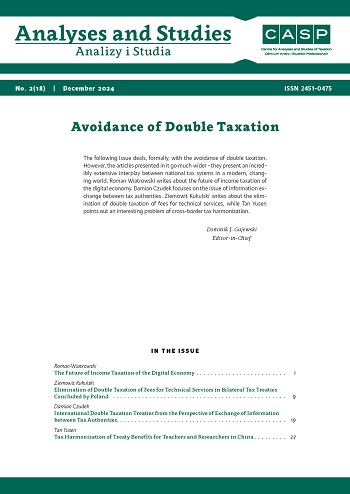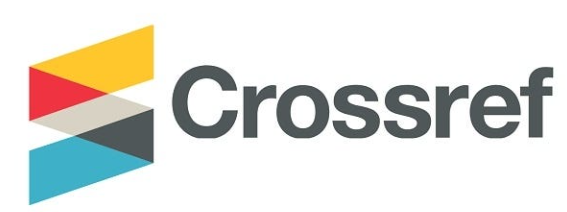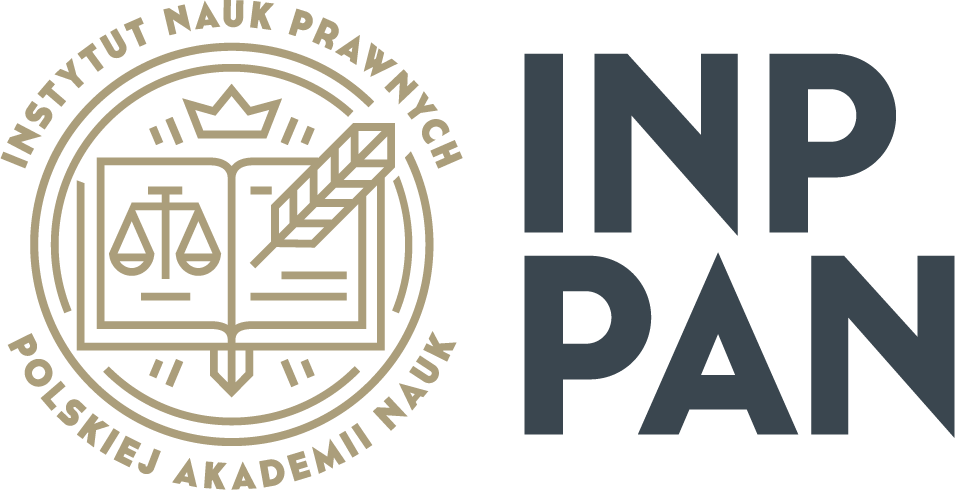Eliminacja podwójnego opodatkowania opłat za usługi techniczne w bilateralnych umowach podatkowych zawartych przez Polskę
DOI:
https://doi.org/10.33119/ASCASP.2024.2.2Słowa kluczowe:
opłaty za usługi techniczne, należności licencyjne, eliminacja podwójnego opodatkowania, podatek u źródła, Konwencja Modelowa OECD, Konwencja Modelowa ONZ, bilateralne umowy podatkowe, polska praktyka traktatowaAbstrakt
Niniejszy artykuł dotyczy polskiej praktyki traktatowej w zakresie eliminacji podwój- nego opodatkowania opłat za usługi techniczne na tle przyjętego w 2017 r. art. 12A KM ONZ. Analiza rozwiązań stosowanych w bilateralnych umowach podatkowych zawar- tych przez Polskę zarówno przed, jak i po 2017 r. z państwami określanymi współcześnie jako państwa tzw. Globalnego Południa pozwala postawić tezę, iż potrzebne jest odrębne modelowe rozwiązanie kwestii opłat za usługi techniczne. Z rozważań zawartych w arty- kule wynika, że regulujący tę problematykę art. 12A KM ONZ, o ile stanie się trwałym elementem polskiej praktyki traktatowej, może przyczynić się do rozwiązania niektórych problemów, jakie powstają na tle klasyfikacji tej kategorii dochodów. Może także przyczy- nić się do ujednolicenia polskiej praktyki traktatowej w tym zakresie.
Bibliografia
Báez Moreno, A. (2021). Because Not Always B Comes after A: Critical Reflections on the New Article 12B of the UN Model on Automated Digital Services. World Tax Journal, 11.
Banach, J. (2010). Komentarz do art. 12 (Należności licencyjne). In: B. Brzeziński (Ed.) Model Konwencji OECD. Komentarz. Warszawa: Wydawnictwo Wiedza i Praktyka.
de Goede, J. (2024). Some Policy Reflections on Article 12B UN Model on Automated Digital Services. A Reasonable Alternative? In: Z. Kukulski, M. Sęk (Eds.), Challenges of Contemporary Tax Law. Jubilee Book Dedicated to Professor Włodzimierz Nykiel, Vol. II. Łódź: Wydawnictwo Uniwersytetu Łódzkiego.
Kukulski, Z. (2022). Eliminacja podwójnego opodatkowania opłat za usługi techniczne w świetle art. 12A Konwencji Modelowej ONZ – rozwiązanie problemu czy źródło nowych sporów interpretacyjnych? Przegląd Prawa Publicznego, 4.
Kukulski, Z. (2023). The Brazil-Poland Double Tax Convention in the Context of the Countries’ Contemporary Tax Treaty Policy and Practice. Kwartalnik Prawa Podatkowego, 4.
Litwińczuk, H. (2020). Międzynarodowe prawo podatkowe. Warszawa: Wolters Kluwer.
Cracea, A. (Ed.) (2018). OECD Model Tax Convention on Income and Capital. Condensed version – 2017 and Key Features of Member Countries 2018. Amsterdam; IBFD Publications.
Martin, J. (n.d.). UN releases updated model tax treaty adding new technical services fees article, https://mnetax.com/un-releases-updated-model-tax-treatyadding-new-technical-service-fees-article-27765 (accessed: 4.10.2024).
Orzechowski-Zölzer, D. (2024). The Taxation of Fees for Technical Services on the Basis of Article 12A UN Model Convention. Series on International Taxation, Vol. 86, Alphen aan Rijn: Wolters Kluwer.
Sangupta, D.P. (2015). Chapter 6: India. In: Y. Brauner, P. Pistone (Eds.), BRICS and the Emergence of International Cooperation. Amsterdam: IBFD Publications.
Tomaleza, R. (n.d.). Brazil’s absence Brazil’s absence from the Multilateral BEPS Convention and the new amending protocol signed between Brazil and Argentina, http://kluwertaxblog.com/2017/09/05/brazilsabsence-multilateral-beps-convention-new-amending-protocol-signed-brazil-argentina/ (accessed: 4.10.2024).
United Nations (2017). United Nations Model Double Taxation Convention between Developed and Developing Countries 2017 Update. New York: Department of Economic and Social Affairs, United Nations, https://www.un.org/esa/ffd/wp-content/uploads/2018/05/MDT_2017.pdf (accessed: 4.10.2024).
Wijnen, W., de Goede, J., Alessi, A. (2012). The Treatment of Services in Tax Treaties. Bulletin for International Taxation, 1.
Wilk, M. (2015). Koncepcja rzeczywistego beneficjenta (beneficial ownership) w międzynarodowym prawie podatkowym. Warszawa: Wolters Kluwer.
Pobrania
Opublikowane
Jak cytować
Numer
Dział
Licencja

Utwór dostępny jest na licencji Creative Commons Uznanie autorstwa – Użycie niekomercyjne 4.0 Międzynarodowe.
Autor (Autorzy) artykułu oświadcza, że przesłane opracowanie nie narusza praw autorskich osób trzecich. Wyraża zgodę na poddanie artykułu procedurze recenzji oraz dokonanie zmian redakcyjnych. Przenosi nieodpłatnie na Oficynę Wydawniczą SGH autorskie prawa majątkowe do utworu na polach eksploatacji wymienionych w art. 50 Ustawy z dnia 4 lutego 1994 r. o prawie autorskim i prawach pokrewnych – pod warunkiem, że praca została zaakceptowana do publikacji i opublikowana.
Oficyna Wydawnicza SGH posiada autorskie prawa majątkowe do wszystkich treści czasopisma. Zamieszczenie tekstu artykuły w repozytorium, na stronie domowej autora lub na innej stronie jest dozwolone o ile nie wiąże się z pozyskiwaniem korzyści majątkowych, a tekst wyposażony będzie w informacje źródłowe (w tym również tytuł, rok, numer i adres internetowy czasopisma).
Osoby zainteresowane komercyjnym wykorzystaniem zawartości czasopisma proszone są o kontakt z Redakcją.
Autor zgadza się na dalsze udostępnianie pracy wg wymagań licencji CC-BY-NC






















